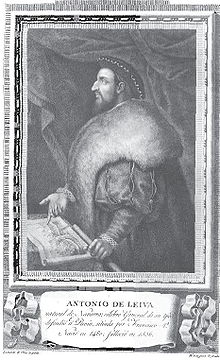Antonio de Leyva
Antonio de Leyva , Duke of Terranuova , Count of Monza, Prince of Ascoli and Margrave of Atella (* 1480 in Leiva , † September 15, 1536 in Aix-en-Provence ) was a Spanish general in the Italian wars and 1535/36 governor of the Duchy of Milan .
Antonio de Leyva came from Navarre and began his military career in internal Spanish conflicts as part of the Mudejar revolt in Granada. He later served in Italy in the war for Naples 1501–1504 under Gonzalo Fernández de Córdoba , the "Gran Capitán". In the Italian Wars he fought in the Battle of Ravenna in 1512 and was wounded there. He then fought under Fernando de Avalos, Margrave of Pescara , near Milan and in the campaign in Provence in 1524. He finally took over the post of commander of the garrison of Pavia and defended the city during the siege by the French army under King Francis I of October 1524 to February 1525. After the battle of Pavia he was given supreme command of the imperial army. After the death of Francesco II. Sforza , the last Duke of Milan from the Sforza family, he received the post of Spanish governor of the Duchy of Milan . He later fought for Emperor Charles V against the Turks and took part in the expedition to North Africa.
In 1529, Emperor Charles V enfeoffed Antonio de Leyva with the county of Monza . He also received the non-hereditary Spanish title of Duke of Terranuova, as well as the titles of Prince of Ascoli and Margrave of Atella.
After his death during another campaign in Provence in 1536, he was buried in the Milanese church of San Dionigi, which was later destroyed. His descendants lived in Milan, where their family at times played a leading role. One of his descendants was Virginia María de Leyva , the "nun of Monza". A street in Madrid is named after her.
literature
- Constantin von Wurzbach : Leva, Antonio Herzog von . In: Biographisches Lexikon des Kaiserthums Oesterreich . 15th part. Imperial and Royal Court and State Printing Office, Vienna 1866, p. 23 ( digitized version ).
- Germán Bleiberg (Ed.): Diccionario de Historia de España. Volume 2: F - M. 2a reimpression. Alianza Editorial, Madrid 1986, ISBN 84-206-5206-7 .
- Angus Konstam : Pavia 1525. The Climax of the Italian Wars (= Osprey Military Campaign Series. 44). Osprey Publishing, London et al. 1996, ISBN 1-85532-504-7 .
Web links
| predecessor | Office | successor |
|---|---|---|
| - |
Governor of Milan 1535–1536 |
Marino Caracciolo |
| personal data | |
|---|---|
| SURNAME | Leyva, Antonio de |
| ALTERNATIVE NAMES | Antonio de Leyva, Duque de Terranova |
| BRIEF DESCRIPTION | Spanish general and statesman |
| DATE OF BIRTH | 1480 |
| PLACE OF BIRTH | Leiva |
| DATE OF DEATH | September 15, 1536 |
| Place of death | Aix-en-Provence |
